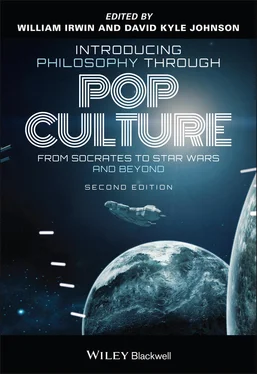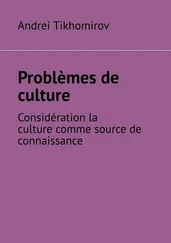Now I suppose you could maintain that there is still sufficient reason to think that there is a chair “out there,” because even if it is not red or smooth or solid, it is something that is causing you to have these sensations. But Russell calls on you to notice that this “something” – whatever it is – is very different from the chair that we first contemplated. Should we even regard it as a physical thing? What does it mean to say that the “chair” exists, as something outside our perceptions, if you do not mean to imply that it has a particular size, shape, color, or texture? The fact of the matter is that all anyone ever has direct access to is their own perceptions. So we can never really be certain about what is causing those perceptions – or even if there is anything out there at all.
Ultimately, it seems that even when we set our worries about Matrix‐type deceptions aside, the true nature of our world turns out to be a very slippery thing. Firm conclusions turn out to be rare, and doubts arise at every turn. But this should not be regarded as altogether bad. For, although philosophical reflection often undercuts our sense of certainty, it can also be very liberating. Once our common‐sense assumptions have been revealed as illusions, we are freed from a kind of system of control. We inevitably find that the world is larger and more mysterious than we had thought, and our certainty is soon replaced with wonder and curiosity. While we may no longer “know” all the answers to life's questions, we can begin the quest to find out.
For pop culture resources and philosophical resources related to this chapter please visit the website for this book: https://introducingphilosophythroughpopculture.com.
1 1Quotes in this chapter designated with a † are from The Matrix (movie). Quotes designated with SS are from The Matrix Shooting Script.
2 2Descartes, R. (1986). Meditations on First Philosophy , 2 (trans. Ronald Rubin). Claremont, California: Areté Press .
3 3For another interesting exploration of dreams and reality try the film Waking Life.
4 4Descartes, 3.
5 5Compare this to Matriculated, the ninth animated short in The Animatrix. It tells the story of a band of rebels who capture a sentient machine and put it into a Matrix of their own design. The machine is then given a set of experiences in order to “brainwash” it into thinking that it is human. This film also suggests a motive for the limits of Neo's own deception – empathy. The rebels set limits on the extent to which they deceive the machine because they do not want to make it a slave. Rather, they want to render it harmless – to make it an ally. This also seems to be the Architect's primary motive in limiting the deceptions of humans within the Matrix.
6 6For a similar sort of deception see Arnold Schwarzenegger in Total Recall.
7 7An exception to this general rule occurs when Neo is caused to “forget” his first interrogation by Agent Smith. Only when Trinity removes the bug from his naval does he recall the event.
8 8In this case Neo would be a sort of futuristic Sisyphus. Though one key difference is that Sisyphus was fully aware of the futility of his work.
9 9Morpheus teaches Neo this lesson in the Kung Fu scene from The Matrix.
10 10Descartes, 6.
11 11This famous phrase comes from Descartes's Discourse on Method.
12 12Descartes, 6. For his now classic “brain in a vat” hypothesis see also Putnam, H. (2008). Reason, Truth, and History. Cambridge: Cambridge University Press.
13 13See Russell, B. (1959). Appearance and reality. In: The Problems of Philosophy (ed. B. Russell ). Oxford: Oxford University Press .
14 14If you think that you know that the chair is composed of atoms, think again. Any evidence for the existence of atoms ultimately depends on sense perceptions. And these, as we've seen, are always just appearances.
6 Adama's True Lie: Earth and the Problem of Knowledge
Eric J. Silverman
What is the nature of knowledge? This chapter examines the science fiction narrative of Battlestar Galactica to address puzzles and problems in epistemology. For example, knowledge has traditionally been defined as a true justified belief. However, this definition actually accepts accidentally true justified beliefs as knowledge. In Battlestar Galactica we see an excellent example of such a belief. Captain Adama claims he is searching for Earth, but he does not even believe it exists. Anyone who believes in Earth's existence based on Adama's testimony would have an accidentally true justified belief. Can such a belief be knowledge?
Battlestar Galactica begins with the ravaging of the known world. The survivors are demoralized, vastly outnumbered by the enemy, and homeless. Against this backdrop Commander Adama offers the promise of a new home where they'll be safe from the Cylons: Earth. But he lies . Yet, in a surprising twist of fate – though not to us who live here – it's later revealed that Adama told a “true lie.” Earth does exist and the Colonials' search for it isn't in vain. Undertaking the journey to this “mythical” home of the Thirteenth Tribe is momentous and filled with religious significance for the Colonial survivors. Faith in Earth's existence gives meaning to an otherwise hopeless situation and shapes the choices they make along the way.
“You're Right. There's no Earth. It’s all a Legend”
There's a sharp distinction between “true belief” and knowledge . President Roslin illustrates this when she asks, “How many people know the Cylons look human?” Colonel Tigh responds, “The rumor mill's been working overtime. Half the ship's talking about it.” But Roslin retorts, “There'll always be rumors. For most people, that's all they'll ever be. I'm asking how many people actually know?” (“Water”). A belief based on an unverifiable rumor isn't knowledge, even if it happens to be true. Knowledge involves a belief in which one has reason for confidence.
A common view claims that knowledge is true belief accompanied by a convincing account justifying the belief. As Plato explains in the Theaetetus :
Now when a man gets a true judgment about something without an account, his soul is in a state of truth as regards that thing, but he does not know it; for someone who cannot give and take an account of a thing is ignorant about it. But when he has also got an account of it, he is capable of all this and is made perfect in knowledge. 1
According to Plato, it's possible to attain truth without knowledge. Knowledge is more certain than mere true belief since the knower possesses a compelling justification for the belief's truthfulness. Someone holding a true belief based on a rumor or a lucky guess doesn't have knowledge because s/he doesn't have a reason for confidence in the belief.
The contemporary philosopher Edmund Gettier demonstrated the inadequacy of this view of knowledge by providing counterexamples in which a person's justification for a true belief turns out to be false. 2 Say that Helo is walking down Galactica 's corridors and sees his wife, Athena. Helo calls out to her, “Sharon!” because he has a compelling justification for believing that's her name. So he believes:
1 The woman in front of me is my wife, Athena.If Helo's justified in believing (a), knows his wife's name, and understands basic rules of reasoning, then he's also justified in believing:
2 The woman in front of me is named “Sharon.”
The truthfulness of (a) logically entails the truthfulness of (b).But let's suppose Helo's mistaken, for it's actually an identical robotic copy of Athena, Boomer who's in front of him – having infiltrated Galactica for some nefarious purpose. But Boomer is also named “Sharon.” Helo's belief (b) turns out to be true, but his justification for believing (b), belief (a), is false. Gettier claims that a counterexample like this shows a justified true belief that isn't knowledge since its justification is false. And this has become known as “the Gettier problem.”
Читать дальше












